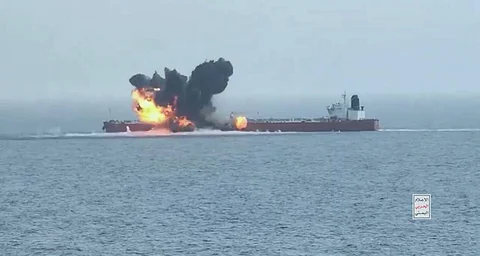

Yemen’s Houthi rebels announced a maritime blockade on Israel’s Haifa port on Monday, in what they called an effort to pressure Israel to halt military operations in Gaza.
The Iran-aligned group, officially known as Ansar Allah, warned shipping companies to avoid the port, marking a significant expansion of its asymmetric warfare campaign beyond previous attacks on Red Sea shipping lanes and sporadic missile strikes.
Blockade Threatens Vital Trade Gateway
Haifa handles nearly 30% of Israel’s maritime trade, including energy imports and consumer goods. The Houthi declaration raises risks for global supply chains already strained by months of attacks in the Red Sea, where the group has disrupted 12% of global trade since late 2023. Insurers are expected to sharply increase premiums for vessels operating near Haifa, mirroring hikes seen during the Red Sea crisis, when shipping costs tripled due to reroutes around Africa’s Cape of Good Hope.
Houthi spokesperson Yahya Saree stated in a televised address that the blockade would persist until Israel ends its genocidal war in Gaza. While most Houthi missiles and drones targeting Israel have been intercepted, the group’s May 6 missile attack on Ben Gurion airport prompted Israeli retaliatory strikes on Yemen, damaging Sanaa’s airport and killing several people.
Asymmetric Tactics Exploit Global Trade Vulnerabilities
Analysts note the Houthis’ strategy relies on low-cost drones, domestically modified missiles, and control of strategic chokepoints like the Bab el-Mandeb Strait. Despite a U.S.-led naval coalition, dubbed Operation Prosperity Guardian, the group has sustained its missile campaign on Israel with continued Iranian support, deploying weapons such as hypersonic missiles capable of striking targets up to 1,300 miles away.
The blockade intensifies economic pressures on Israel, whose GDP is 60% reliant on trade, while deepening regional instability. Maritime stakeholders warn of prolonged disruptions, with over 190 attacks on commercial shipping since November forcing extended transit times and higher costs.
Broader Implications
The move underscores the growing influence of non-state actors in global conflicts, leveraging geographic and technological advantages to offset conventional military weaknesses. It also highlights the fragility of international supply chains, with the Houthis exploiting vulnerabilities to amplify their political demands.
As tensions escalate, diplomatic efforts to curb Iranian support for the Houthis have stalled, while Israel faces mounting scrutiny over its Gaza campaign. The U.S. and allies remain locked in a cycle of deterrence, with over 800 airstrikes on Houthi targets since March 2024 failing to neutralize the threat.